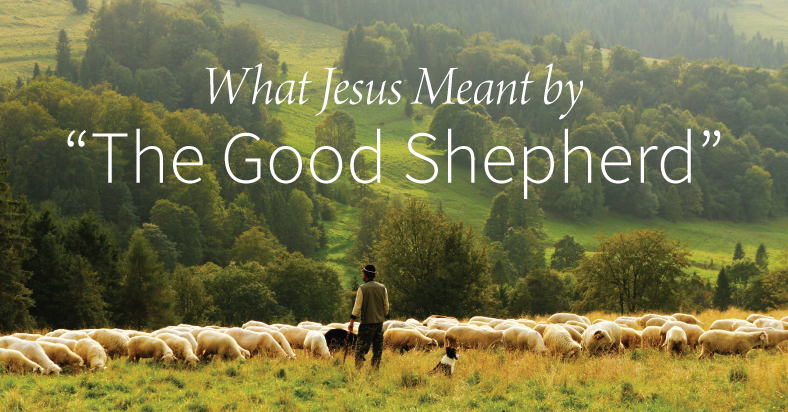Another metaphor that conveys the Lord’s provision for his people is that of the faithful shepherd, who protects his sheep against predators and provides for them by finding rich and safe pastureland and fresh water. On his deathbed, Jacob spoke of the Lord as his shepherd and invoked the shepherd’s protection and provision for his son Joseph (Gen. 48:15; 49:24; see Ps. 80:1). Looking back to the exodus and the Lord’s provision and protection in the wilderness, a psalmist evoked the image of the shepherd:
Then he led out his people like sheep and guided them in the wilderness like a flock. He led them in safety, so that they were not afraid, but the sea overwhelmed their enemies. (Ps. 78:52–53; see also 77:19–20)
Old Testament Setting
King David, called by God from herding sheep and anointed to lead God’s people, sang confidently of the Lord, his shepherd, who ensured that he lacked nothing, made him rest in lush pastures and drink from still waters (Ps. 23:1–2), and protected him from violent enemies in the valley of the shadow of death (vv. 4–5).
This rich Old Testament imagery of the Lord as his people’s shepherd is the background for Jesus’ announcement that he is the Good Shepherd, come at last to lay down his life to secure his sheep’s eternal and abundant life (John 10:1–30). Jeremiah and Ezekiel had shown that those who were charged to care for God’s flock in the past had proved to be predators consuming the flock or hirelings eager to save their own skins rather than defending the vulnerable sheep (Jer. 23:1–6; Ezek. 34; John 10:8, 10, 12–13). As Lord of the flock, Jesus knows his sheep, calls them by name, and lays down his life for theirs, to secure their safety in his own hand and his Father’s hand forever (John 10:17–18, 27–29). His open announcement, “I and the Father are one” (v. 30), which so shocked his listeners that they prepared to execute him for blasphemy (vv. 31–33), was the self-evident conclusion of his shepherding role, which Israel’s God had claimed for himself in Ezekiel 34.
Fulfilled in Christ
Elsewhere in the New Testament as well, Jesus is identified as his people’s shepherd, who provides for the flock of God (Acts 20:28–30; Heb. 13:20; 1 Peter 2:25; 5:2–4). Revelation 7 describes the peace and provision enjoyed by those whose robes have been washed in the blood of the Lamb, since “the Lamb in the midst of the throne will be their shepherd, and he will guide them to springs of living water, and God will wipe away every tear from their eyes” (7:17). The words that John heard and recorded blended the promise of the final feast of joy (Isa. 25:6–9, quoted above) with the hope of a new exodus and pilgrimage, led by the Lord through his faithful Servant:
They shall feed along the ways; on all bare heights shall be their pasture; they shall not hunger or thirst, neither scorching wind nor sun shall strike them, for he who has pity on them will lead them, and by springs of water will guide them. (Isa. 49:9–10)
The Lamb, faithful shepherd to provide his flock’s every need, is none other than Jesus, who shed his blood to wash believers’ consciences clean in pristine purity.
They point to Jesus!
What does this mean for the many texts in which we see the covenant Lord providing nourishment for his people, whether as husband or as shepherd? They point us to Jesus! He is the bread of heaven, exemplified by the manna in the wilderness. He is the Rock from which living water flows. Just as Jesus implemented the Father’s plan for creation, so Jesus implements the Father’s gracious provision for us. Wherever the Bible speaks of the Lord’s giving his people what we need to survive and to thrive, the text is pointing us to Christ the Lord, “who crowns you with steadfast love and mercy, who satisfies you with good so that your youth is renewed like the eagle’s” (Ps. 103:4–5).
About the Author
 Dennis E. Johnson (ThM, Westminster Theological Seminary; PhD, Fuller Theological Seminary) is professor of practical theology at Westminster Seminary California. He is also an ordained minister in the Presbyterian Church in America, author of Walking with Jesus Through His Word, and a contributor to numerous books and theological journals.
Dennis E. Johnson (ThM, Westminster Theological Seminary; PhD, Fuller Theological Seminary) is professor of practical theology at Westminster Seminary California. He is also an ordained minister in the Presbyterian Church in America, author of Walking with Jesus Through His Word, and a contributor to numerous books and theological journals.
About the Book
 In Walking with Jesus Through His Word, Dennis Johnson takes readers of the Bible on a journey of discovery through the Old and New Testaments, pointing out a network of trails in the text. These are recurring themes that link different parts of the Bible to Jesus the Christ, the fulfiller of God’s promises and redeemer of God’s people.
In Walking with Jesus Through His Word, Dennis Johnson takes readers of the Bible on a journey of discovery through the Old and New Testaments, pointing out a network of trails in the text. These are recurring themes that link different parts of the Bible to Jesus the Christ, the fulfiller of God’s promises and redeemer of God’s people.


Comments